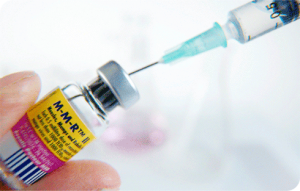A controversy that was big a couple of years ago was whether or not vaccines cause autism. Jenny McCarthy, a big name celebrity, used to spend time in the spotlight speaking out against vaccines, claiming that they caused autism in her son. The idea of stopping vaccines to prevent autism is worrisome for many doctors because all of the devastating diseases that have been eradicated by vaccines have the potential to come back, like polio for example.
The issue came about when in 1998, a medical journal named The Lancet, released a paper claiming that vaccines can cause autism in growing children. It was later found that this writer changed his findings, was completely biased, and unethically conducted research. This might seem plausible because children receive the suspected vaccines around the time they should be starting to talk/walk. So, when the children don’t begin to talk or walk, it seems like vaccines could be the cause. Therefore, despite the completely unreliable study, it is still a worry of many confused parents. This goes to show that one study can completely change the public’s opinion about a topic which can be severely detrimental to us, if we are wrongly informed.
Loads of studies have been done to see if there is a link between the disease with no known cause and vaccines. It was at one point thought that mercury-containing thimerosal causes the developmental issues so it was removed from vaccines. However, if this actually caused autism, there should have been a decrease in autism rates. There was no drop in the rates, so that adds a point in the favor of vaccines.
Studies to find evidence on the issue can be based on children who get vaccines and seeing their development in the years after. Many studies such as this have been done by the CDC and show no causal link between autism development and vaccinations. It might not be ethical to try studies such as a double-blind placebo trial. We have established that vaccines prevent often-deadly diseases, so to randomly prevent children in a trial from getting them would be silly and potentially dangerous. It would be different if the vaccines were something like a controversial new cancer treatment, but we have pretty much decided that vaccines are good, so it would be of poor decision to deny children them.
Considering all of the studies done in favor of vaccines, and only one super-biased report against them, I, along with most scientists, would conclude that vaccines are safe and should be administered because there is no link between them and autism.

